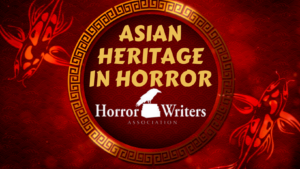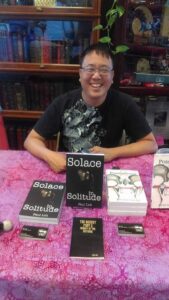Asian Heritage in Horror: Interview with Paul Loh

 Paul Loh is a musician/actor/author. He has written around 100 songs. He has also appeared in several movies. He has written two novellas: ‘The Nocent part 2: Advent of the Scathing’ and ‘The Greater Number’ and edited a trilogy of horror anthologies of short horror stories called ‘Possessions’. His story, ‘Smart Phone’ is in post-production to be made into a movie. He has a collection of his own short horror fiction out, called Solace In Solitude. A second collection of his stories called, Pockets Of Humanity will be out by the end of 2022. He is currently working on a book called, Madness To My Method, showcasing his comedic outlook of the world through the lens of autism.
Paul Loh is a musician/actor/author. He has written around 100 songs. He has also appeared in several movies. He has written two novellas: ‘The Nocent part 2: Advent of the Scathing’ and ‘The Greater Number’ and edited a trilogy of horror anthologies of short horror stories called ‘Possessions’. His story, ‘Smart Phone’ is in post-production to be made into a movie. He has a collection of his own short horror fiction out, called Solace In Solitude. A second collection of his stories called, Pockets Of Humanity will be out by the end of 2022. He is currently working on a book called, Madness To My Method, showcasing his comedic outlook of the world through the lens of autism.
What inspired you to start writing?
My dad is the person most responsible for inspiring me to start writing. When I was in the 7th grade, he helped my little sister and me to create our own magazine. I wrote jokes, movie reviews, poetry, and started drawing a comic strip. We called it Sneak Magazine, and gave copies to our friends and classmates. From there, I never lost my passion for writing.
What was it about the horror genre that drew you to it?
The video for Michael Jackson’s Thriller got me interested in the horror genre. I was 6 at the time it came out. There was also a “making of” documentary that came out, which got me interested in filmmaking. As a kid, I didn’t understand a lot of films aimed at a more mature audience. I knew nothing of romance, war, crashing cars, or saving the world. But I did understand fear. Horror tapped into something I had known since my first memories. Not only that, it provided me a safe space in which to face and overcome my fears. Growing up, I watched my friends turn to smoking, drinking, sex, and drugs in order to avoid facing the darkness within themselves. I faced it daily, and consequently was able to face the world fearlessly, and with confidence. I strive to imbue that same attitude in my audience.
Do you make a conscious effort to include Asian and/or Asian Diaspora characters and themes in your writing and if so, what do you want to portray?
Many of my stories incorporate Asian characters. Some of them include slice of life portrayals of life in a Korean household and family. Korean traditions, foods, beverages, strict parents, historical events and their effects on people are things I want people to become aware of. Here and there, some Chinese traditions, but I was not as exposed to them much growing up.
What has writing horror taught you about the world and yourself?
Due to the Thriller video, as well as my autism, I became hyperfixated on zombies. Various zombie books and movies showed me something most genres never portray, the emotional impact of the death of a loved one. In my writing, I explore all those emotions, whether it’s regret, frustration, rage, sadness, or vindication. My upcoming book, Pockets Of Humanity contains short stories in which I touch upon people’s lives whom have been affected by a zombie apocalypse. An elderly couple, a widower, a rebellious teen, an ostracized gay man who is reunited with his estranged father, and a man who is trapped beneath the rubble of a collapsed building as he holds the hand of his now dead wife. Horror, like metal music, deals with emotions most other genres refuse to touch.
How have you seen the horror genre change over the years? And how do you think it will continue to evolve?
Horror seems to be delving into more abstract topics like the horrors of parenting, sexually transmitted disease, environmental concerns, and cults. There is horror to be found in a myriad of great new avenues that I’m glad we’re pioneering.
How do you feel Asian and Asian Diaspora communities have been represented thus far in the genre and what hopes do you have for representation in the genre going forward?
We haven’t had as much representation as perhaps the African American or Latino communities have gotten, but I am actively trying to rectify that. There are plenty more communities that I’d love to see represented more, such as native American, Middle Eastern, and Australian. But also depressed, anxious, autistic, LGBT+, bipolar, and other widely misunderstood people.
The folk tales my Korean grandmother used to tell me, made the Grimm fairy tales sound like Mother Goose. Stories of tigers chasing children, trolls cursing men, an infant thrown into molten metal to forge a bell with the purest sound ever. Everyone has heard of Snow White, Rapunzel, and Rumplestiltskin. But Asian folklore is fertile ground for horror stories.
Who are some of your favorite Asian characters in horror?
One of my favorites was Glenn from the Walking Dead. He didn’t know martial arts, wasn’t some sort of genius. He was just another guy. As a matter of fact, his race was rarely mentioned. That’s what I want to become the norm. When I’m out with my friends, I’m not the Asian friend, I’m just Paul.
Who are some Asian / Asian Diaspora horror authors you recommend our audience check out?
Saul Tanpepper, me of course. I don’t know. Is Edward Lee Asian? It’s embarrassing that I don’t know how to answer this question in depth.
What is one piece of advice you would give horror authors today?
Horror can be found everywhere you look. I edited an entire trilogy of short horror anthologies about ordinary objects that have somehow become dangerous. The Possessions trilogy shows that you can make anything scary. I have worked at several haunted houses. I used costumes and masks, but honestly, I can scare someone in my street clothes. It’s all about turning people’s imaginations against themselves. The clown with the chainsaw stays behind when you go home, but your imagination stays with you even when you’re alone in your bed in the dark. If you scare a man’s eyes, you scare him for a day. If you scare a man’s mind, you scare him for a lifetime. I have honestly been more scared by my imagination than by any horror book or movie ever.
And to the Asian and Asian Diaspora writers out there who are just getting started, what advice would you give them?
Write what you know. If your nightmares scare you, they will scare your audience. If you have OCD, or are autistic, or bipolar, there are horrors unique to your situation. But at the same, they will be relatable to people like you. Let’s say, you’re compelled to flip your light switch five times when you enter a room. What would happen if you don’t? Asian parents are a ripe ground for horror story telling. Joy Luck Club during an alien invasion adds a whole new dimension of intricacy to a played out scenario. Use what’s familiar to you to simultaneously enlighten and frighten. Culture shock is just another form of the fear of the unknown. It’s a weapon in your arsenal that many underutilize.



